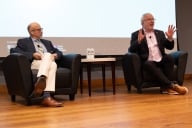You have /5 articles left.
Sign up for a free account or log in.
While other universities move quickly to offer courses online for free, Carnegie Mellon University is instead starting for-profit efforts designed to capture segments of the education market.
Provost Mark Kamlet said the university is looking for a "financially sustainable" way to expand its reach. So far, that means a handful of spinoffs with a variety of products aimed at workforce development and online education.
One subsidiary helps other companies improve business practices. Another is helping Mexico lure outsourced software jobs. A recently formed subsidiary hopes to help top-tier research institutions offer credit-worthy online courses.
At the same time, Carnegie Mellon is shying away from massive open online courses, or MOOCs, the all-comers craze sweeping through higher education circles.
Two top MOOC providers – Coursera, a Silicon Valley company with 62 university members, and edX, a nonprofit started by Harvard University and Massachusetts Institute of Technology – are both expanding but also still looking for ways to generate revenue. Among universities with strong programs in technology and entrepreneurial mindsets -- a group that would decidedly include Carnegie Mellon -- administrators are rushing to be sure their institutions aren't left behind by the MOOC bandwagon.
Carnegie Mellon Inc.
The university owns or has a stake in several companies, with more spinoffs possible in coming months:
Clearmodel (2012), a subsidiary, consults with businesses that want "process improvements" using a technique developed at Carnegie Mellon
iCarnegie Global Learning (2012), a subsidiary, does work force training
Sources: Carnegie Mellon University and Pennsylvania Secretary of State's Office
Kamlet said Carnegie Mellon is working on an approach that encourages financially solvent business plans from the get-go.
“To be honest, I think there are some challenges – edX and Coursera would be the first to admit that they are going to see how things go over time in terms of a business model,” Kamlet said.
A new Carnegie Mellon subsidiary, Acatar, is aiming to help universities move courses from the classroom to the web -- but not for free. It costs the company “north of $150,000” to customize a course for the web, said company CEO Matthew Cooper. Acatar would then seek to recoup that upfront cost through revenue sharing with universities. (This paragraph has been updated to clarify how the company plans to make money.)
Kamlet, who is the company’s non-executive chairman, and Cooper said Acatar customers will be paying for an online class they can use to offer highly interactive courses for credits. Carnegie Mellon will begin using the software to offer some courses this fall.
The company's tagline is "Uncompromising Online Education" -- a perhaps less-than-subtle contrast to MOOCs that have been put together quickly for the masses.
“There is no dilution of the rigor,” Cooper said. “There is no asterisk behind the courses.”
Still, the company will have to set itself apart in a crowded space. Acatar comes from a tradition of online course "enablers" like Bisk, Deltak, Academic Partnerships, 2U (formerly 2tor) and Pearson, which recently bought Embanet/Compass, another major player in the online course world. Some of them have prestigious clients of their own.
Cooper said the company is in serious discussions with another university, which he did not name. Asked if the company could show a demo of the software, Cooper said the company is not currently making its interface available to the public.
Kamlet said Acatar will offer an experience that will “blur the distinction” between learning in the classroom and learning behind a computer screen.
Kamlet said he doesn’t have a problem with MOOCs, but he said the current experience is based on “very old technology” or, in some cases, “just a variance of YouTube.”
“It’s been around since TV came around, where people would have programs on public television where you would learn to paint sunsets and stuff,” Kamlet said.
Carnegie Mellon's faculty leaders are also wary of MOOCs, said Anthony Rollett, a former faculty senate chairman.
"We are skeptical that MOOCs as commonly presented do anything more than provide a showcase (or, at best, outreach) for whichever university is offering them," Rollett said in an e-mail. "Another way to say it is that you have to measure what learning is taking place, not just student satisfaction. Concerning the latter, it's interesting to me that one common measure of quality of an institution is student retention. For some reason, this measure is not being applied to MOOCs."
Hundreds of thousands of students have signed up for free MOOCs, and data suggest the percentage who finish some courses is in the single digits.
'Our business'
Kamlet said Carnegie Mellon is trying to provide “high quality at a very good price” through its affiliates, including for-profits.
"One of the reasons that we wanted to do them within Carnegie Mellon is we sort of view it as the business of our business,” Kamlet said. “That’s sort of what we do, and we think these things have a lot to offer the world – they are going to have a big impact in workforce [training].”
One university subsidiary, iCarnegie, is helping open training centers throughout Mexico so the country can become a successful destination for technology outsourcing. Kamlet said Mexico has made it a “pretty major priority” to become, like India, a top destination for technology work. The subsidiary is also working on a new campus in Russia, he said.
Another subsidiary is Clearmodel, the home of Carnegie Mellon’s CMMI Institute, which helps companies improve their business practices using a technique developed at the university in the 1980s.
Some of the efforts overlap. For instance, Acatar will use software developed by Panopto, a Carnegie Mellon spinoff that has software to capture and manage video presentations. Video is a key part of most online classes.
Other efforts at Carnegie Mellon affiliates do not overlap. The Open Learning Initiative, or OLI, is a grant-funded nonprofit that works to create model undergraduate courses for adoption across the country.
The nonprofit is also a pioneer in online learning and offers 18 computer-guided courses on its website. It and Acatar share no personnel.
Kamlet said each effort has its own niche. “Every day I come into the office and ask myself that, ‘What on earth is all this stuff?’” he said. “[Acatar] actually is different between the OLI, which we are very supportive of, and these other entities.”
Carnegie Mellon has long avoided simply offering its course material free of charge to the public, though it does currently offer some lecture material on iTunes U.
In 2001, representatives from the William and Flora Hewlett Foundation came to Pittsburgh to meet with Carnegie Mellon officials to talk about a project similar to MIT’s OpenCourseWare project. Norman Bier, the current associate director of the learning initiative, said university officials told the foundation representatives they were not interested in MIT's approach.
“No, not really, MIT seemed to have this covered,” Bier said the message was at the time.
The foundation representatives were set to leave, but it was Sept. 11 and planes were grounded. During the longer-than-expected talks, the university and the foundation decided to work together but to take a different track than MIT, Bier said. At first, the Carnegie Mellon group focused on computer-guided online courses.
Now, the group is focused on crafting a few model courses that can be used again and again in a variety of settings across the country.
Currently, the group is working with the Bill & Melinda Gates Foundation to see if a few courses developed at Carnegie Mellon can be used to help community college students across the country.
More than a decade after the 2001 meeting, which nearly ended fruitlessly because the university was not gung-ho simply for open access, Bier said his group's work and MOOCs’ approach may be irreconcilable.
“Our interest really hasn’t been on just scaling the lecture, but focus on where the learning has been and scaling the learning,” Bier said.








